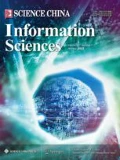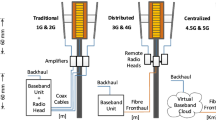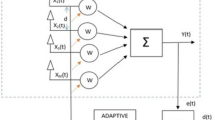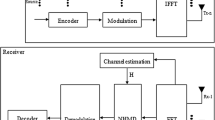Abstract
In this paper, the decentralized transceivers and corresponding channel state information (CSI) signaling concepts are proposed for weighted sum rate (WSR) maximization, via linear downlink transceiver optimization in multi-relay aided multiuser multiple-input multiple-output (MIMO) networks. Three decentralized algorithms are proposed with the local CSI requirements at the base station (BS) and the relay nodes. In the first proposed algorithm, the generalized channel inversion precoding is used at the BS to avoid the second hop channel sharing requirements among the relay nodes, and decentralized transceiver optimization of the relay nodes and users are developed to maximize the WSR. A minimum mean square error (MMSE)-based enhanced method is proposed as well. To further improve the performance, we provide a novel structure of the precoding matrix of the BS. The decentralized joint BS, relay and user transceiver optimization problem is formulated and solved. Also, the CSI signaling and decentralized processing in the time division duplex (TDD) system are analyzed. Simulation results show the effectiveness of the decentralized transceiver design compared to the existing algorithms.
Similar content being viewed by others
References
Tang X, Hua Y. Optimal design of non-regenerative MIMO wireless relays. IEEE Trans Wirel Commun, 2007, 6: 1398–1407
Rong Y, Tang X, Hua Y. A unified framework for optimizing linear nonregenerative multicarrier MIMO relay communication systems. IEEE Trans Signal Process, 2009, 57: 4837–4851
YU J, Liu D, Yin C, et al. Relay-assisted MIMO multiuser precoding in fixed relay networks. In: Proceedings of International Conference on Wireless Communications, Networking and Mobile Computing, Shanghai, 2007. 881–884
Li G, Wang Y, Wu T, et al. Joint linear filter design in multi-user non-regenerative MIMO-relay systems. In: Proceedings of IEEE International Conference on Communications, Dresden, 2009. 1–6
Jang S, Yang J, Kim D K. Minimum MSE design for multiuser MIMO relay. IEEE Commun Lett, 2010, 14: 812–814
Liu J, Qiu Z. Robust sum-MSE transceiver optimisation for multi-user non-regenerative MIMO relay downlink systems. Electron Lett, 2011, 47: 411–412
Xing C, Ma S, Xia M, et al. Cooperative beamforming for dual-hop amplify-and-forward multi-antenna relaying cellular networks. Signal Process, 2012, 92: 2689–2699
Wang H, Chen W. Joint source and relay design for multiuser MIMO nonregenerative relay networks With direct links. IEEE Trans Veh Technol, 2012, 61: 2871–2876
Li C, Iwanami Y. Comparative study of transmit weight designs for nonregenerative Multiuser MIMO downlink relay system. In: 6th International Conference on Signal Processing and Communication Systems. Piscataway: IEEE, 2012. 1–6
Shi H, Abe T, Asai T, et al. Relaying schemes using matrix triangularization for MIMO wireless networks. IEEE Trans Commun, 2007, 55: 1683–1688
Oyman O, Paulraj A J. Design and analysis of linear distributed MIMO relaying algorithms. IEEE Proc Commun, 2006, 153: 565–572
Rong Y, Xiang Y. Multiuser multi-hop MIMO relay systems with correlated fading channels. IEEE Trans Wirel Commun, 2011, 10: 2835–2840
Lzi Y A, Falahati A. Amplify-forward relaying for multiple-antenna multiple relay networks under individual power constraint at each relay. EURASIP J Wirel Commun Network, 2012, 1: 1–10
Ma S, Xing C, Fan Y, et al. Iterative transceiver design for MIMO AF relay networks with multiple sources. In: Procedings of IEEE Military Communications Conference, San Jose, 2010. 369–374
Xing C, Ma S, Fei Z, et al. How to understand linear minimum mean square error transceiver design for multiple input multiple output systems from quadratic matrix programming. IET Commun, 2013, 7: 1231–1242
Chalise B K, Zhang Y D, Amin M G. Successive convex approximation for system performance optimization in a multiuser network with multiple MIMO relays. In: Proceedings of 4th IEEE International Computational Advances in Multi-Sensor Adaptive Processing Workshop, San Juan, 2011. 229-232
Truong K T, Heath R W. Interference alignment for the multiple-antenna amplify-and-forward relay interference channel. In: Proceedings of 45th Asilomar Conference on Signals, Systems and Computers, Pacific Grove, 2011. 1288–1292
Cho Y M, Jang S, Kim D K, et al. Minimum sum-MSE design for distributed multi-relay aided multi-user MIMO network. In: Proceedings of IEEE 54th International Midwest Symposium on Circuits and Systems, Seoul, 2011. 1–4
Boyd S, Vandenberghe L. Convex Optimization. Cambridge: Cambridge University Press, 2004
Christensen S S, Agarwal R, Carvalho E, et al. Weighted sum-rate maximization using weighted MMSE for MIMO-BC beamforming design. IEEE Trans Wirel Commun, 2008, 7: 4792–4799
Lee K J, Sung H, Park E, et al. Joint optimization for one and two-way MIMO AF multiple-relay systems. IEEE Trans Wirel Commun, 2010, 9: 3671–3681
Shin J, Moon J. Weighted sum rate maximizing transceiver design in MIMO interference channel. In: Proceedings of IEEE Global Telecommunications Conference, Huston, 2011. 1–5
Sung H, Lee S R, Lee I. Generalized channel inversion methods for multiuser MIMO systems. IEEE Trans Commun, 2009, 57: 3489–3499
Shen H, Li B, Tao M, et al. MSE-based transceiver designs for the MIMO interference channel. IEEE Trans Wirel Commun, 2010, 9: 3480–3489
Zhang Z, Zhang W, Tellambura C. MIMO-OFDM channel estimation in the presence of frequency offsets. IEEE Trans Wirel Commun, 2008, 7: 2329–2339
Zhang Z, Zhang W, Tellambura C. Cooperative OFDM channel estimation in the presence of frequency offsets. IEEE Trans Veh Technol, 2009, 58: 3447–3459
Zhang Z, Zhang W, Tellambura C. OFDM uplink frequency offset estimation via cooperative relaying. IEEE Trans Wirel Commun, 2009, 8: 4450–4456
Author information
Authors and Affiliations
Corresponding author
Rights and permissions
About this article
Cite this article
Sun, Q., Li, L. & Mao, J. Decentralized transceiver optimization for multi-relay aided multiuser MIMO networks. Sci. China Inf. Sci. 57, 1–13 (2014). https://doi.org/10.1007/s11432-014-5088-6
Received:
Accepted:
Published:
Issue Date:
DOI: https://doi.org/10.1007/s11432-014-5088-6




